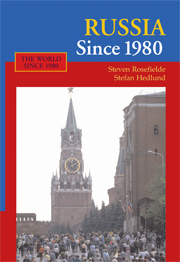Book contents
- Frontmatter
- Contents
- List of Figures, Tables, and Boxes
- Acronyms
- Timeline
- Preface
- Acknowledgments
- Introduction
- PART I RUSSIA BEFORE 1980
- PART II GORBACHEV
- PART III YELTSIN
- PART IV PUTIN
- PART V ADVANCE AND RETREAT
- 10 Semblance of Democracy
- 11 Social Change and Adaptation
- 12 International Relations
- PART VI PROSPECTS
- Conclusion
- Glossary
- Bibliography
- Index
- References
12 - International Relations
Published online by Cambridge University Press: 05 June 2012
- Frontmatter
- Contents
- List of Figures, Tables, and Boxes
- Acronyms
- Timeline
- Preface
- Acknowledgments
- Introduction
- PART I RUSSIA BEFORE 1980
- PART II GORBACHEV
- PART III YELTSIN
- PART IV PUTIN
- PART V ADVANCE AND RETREAT
- 10 Semblance of Democracy
- 11 Social Change and Adaptation
- 12 International Relations
- PART VI PROSPECTS
- Conclusion
- Glossary
- Bibliography
- Index
- References
Summary
The Soviet defeat of Nazi Germany; Joseph Stalin's postwar expansion in East Europe; the iron curtain; Mao Tse-tung's, Kim Il-song's, and Ho Chi Minh's triumphs in Asia, Castro's victory in Cuba in 1959; and Marxist insurgencies across the globe made it seem that the tide of history was “red” well into the 1970s. Although Nikita Khrushchev spoke of peaceful coexistence in the mid-1950s, the combination of rapid socialist economic modernization and Marxist messianism seemed unstoppable, despite the Polish and Hungarian uprisings of 1956, the Sino-Soviet rift, and the 1968 Prague Spring. The Kremlin's foreign policy during this period was cold war, Muscovite empire building with a communist gloss.
Then suddenly and without warning Soviet communism lost momentum. Economic growth decelerated despite a massive arms buildup that made the USSR a superpower. Neoliberal economic theory gained a toehold in the West, American military prowess recovered from the Vietnam debacle, and global revolutionary fervor subsided so noticeably that Marshal Nikolai Ogarkov, chief of the Soviet General Staff grumbled about an adverse turn in the correlation of forces.
Soviet triumphalism evident in the mid-1970s was displaced just five years later by the specter of domestic economic stagnation and a reversal of international fortune. Moscow responded by intensifying expenditures on technological innovation and defense and proclaiming Mikhail Gorbachev's doctrine of novoe myshlenie (new thinking) in 1987. After forty years of confrontation, the Soviet leadership began speaking wistfully about returning to its “common western home,” attempting to reconcile opposites or even westernize.
- Type
- Chapter
- Information
- Russia Since 1980 , pp. 211 - 228Publisher: Cambridge University PressPrint publication year: 2008

